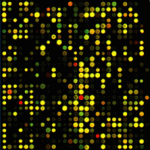Genomics
|
14 october 2014 07:09:14 |
| Genome of the house fly, Musca domestica L., a global vector of diseases with adaptations to a septic environment (Genome Biology) |
|
Tweet Background:
Adult house flies, Musca domestica L., are mechanical vectors of more than 100 devastating diseases that have severe consequences for human and animal health. House fly larvae play a vital role as decomposers of animal wastes, and thus live in intimate association with many animal pathogens.
Results:
We have sequenced and analyzed the genome of the house fly using DNA from female flies. The sequenced genome is 691 Mb. Compared with Drosophila melanogaster, the genome contains a rich resource of shared and novel protein coding genes, a significantly higher amount of repetitive elements, and substantial increases in copy number and diversity of both the recognition and effector components of the immune system, consistent with life in a pathogen-rich environment. There are 146 P450 genes, plus 11 pseudogenes, in M. domestica, representing a significant increase relative to D. melanogaster and suggesting the presence of enhanced detoxification in house flies. Relative to D. melanogaster, M. domestica has also evolved an expanded repertoire of chemoreceptors and odorant binding proteins, many associated with gustation.
Conclusions:
This represents the first genome sequence of an insect that lives in intimate association with abundant animal pathogens. The house fly genome provides a rich resource for enabling work on innovative methods of insect control, for understanding the mechanisms of insecticide resistance, genetic adaptation to high pathogen loads, and for exploring the basic biology of this important pest. The genome of this species will also serve as a close out-group to Drosophila in comparative genomic studies. |
| 153 viewsCategory: Bioinformatics, Genetics, Genomics |
 OncoCis: annotation of cis- regulatory mutations in cancer (Genome Biology) OncoCis: annotation of cis- regulatory mutations in cancer (Genome Biology)Transcriptomic analysis reveals tomato genes whose expression is induced specifically during effector-triggered immunity and identifies the Epk1 protein kinase which is required for the host response to three bacterial effector proteins (Genome Biology) 
|
| blog comments powered by Disqus |
MyJournals.org
The latest issues of all your favorite science journals on one page
The latest issues of all your favorite science journals on one page



